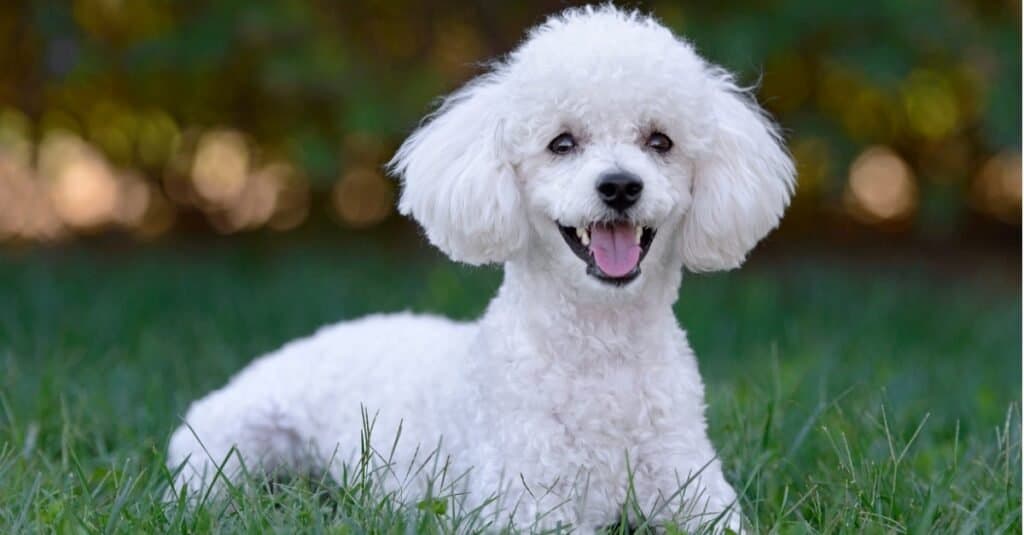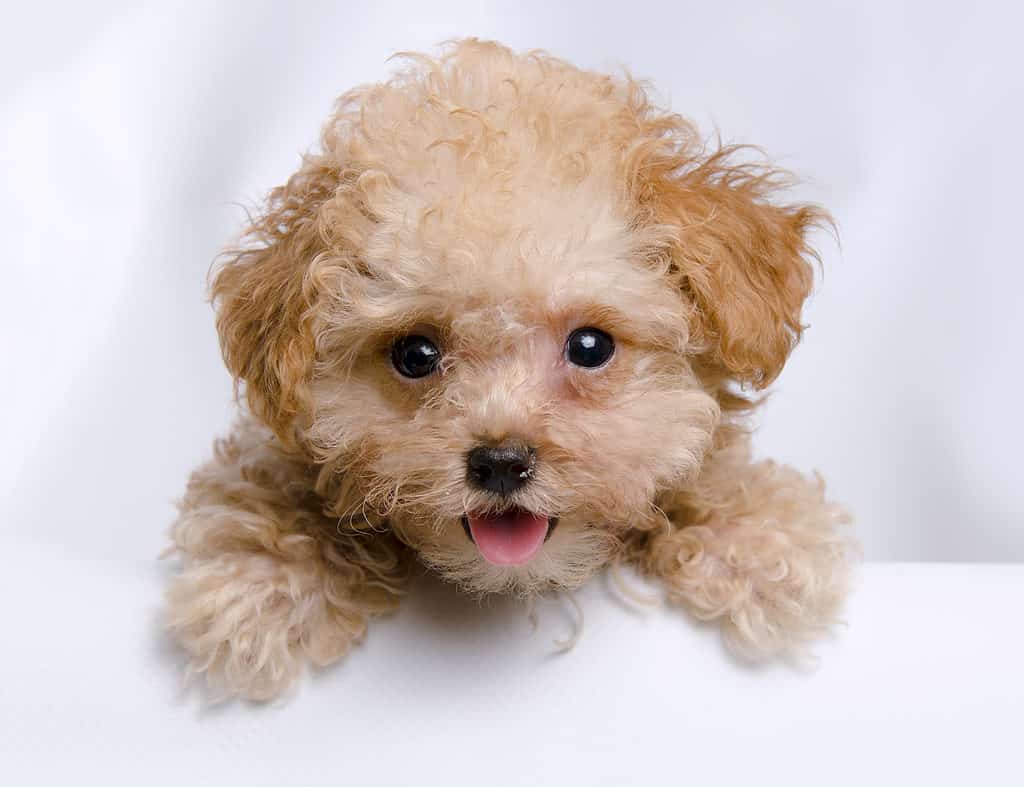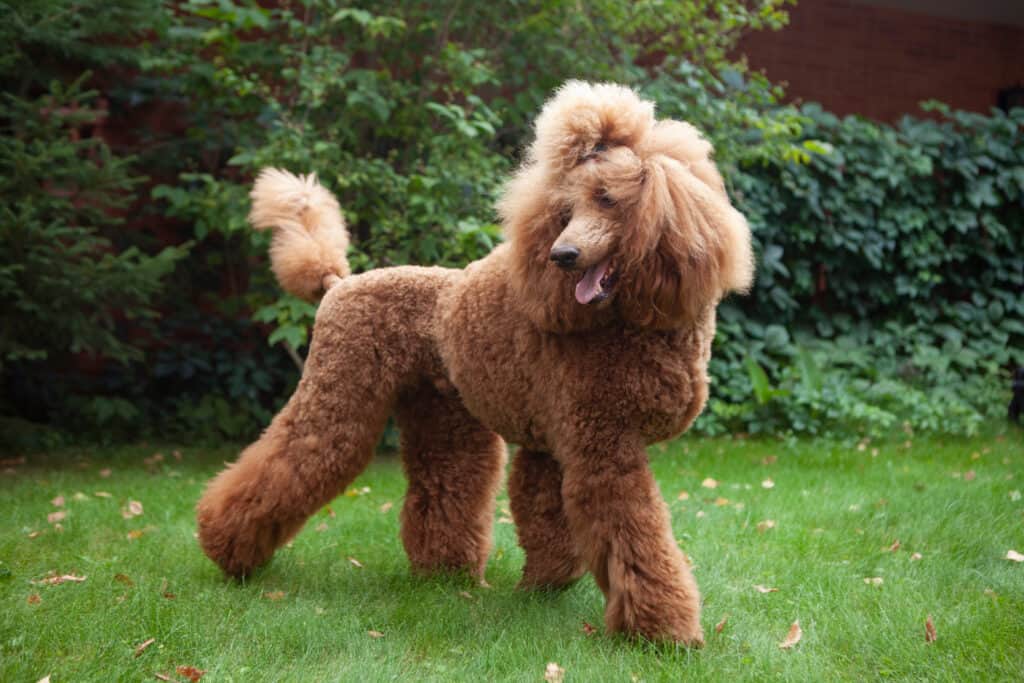Poodles are fun and energetic dogs. They make an excellent choice for individuals and families with an active lifestyle. And they are intelligent and easy to train. Like many breeds, poodles need to be socialized at an early age. They also need lots of exercise and daily grooming. But with the right family and routine, these dogs can be great companions.
If you have your heart set on getting a poodle, you may be wondering, “Are poodles hypoallergenic?” Or will they keep you reaching for the tissues and needing allergy shots? Discover the answer, including how much they shed and what poodle breed is the best for allergy sufferers.
Are Poodles Bad for Allergies?

Poodles are hypoallergenic dogs due to their dense, curly low-shed hair. They are also low-drooling dogs, which benefits allergy sufferers.
©iStock.com/tsik
The poodle is a hypoallergenic dog, making them an excellent breed for people with pet allergies. But no breed is truly hypoallergenic. Some, like poodles, are just less likely to cause allergies than others. Due to their dense, curly hair, they don’t shed as much. They also have a single layer of fur rather than a fluffy double coat, like many dog breeds. Not only are poodles low-shed dogs, but they are also low-drooling.
Proteins found in dog dandruff, drool, and urine can trigger allergy symptoms in those sensitive to these specific allergens. Allergy symptoms can include sneezing, runny nose, itchy eyes, and sinus pain. Those with severe allergies can experience trouble breathing and chest tightness. Some also break out in itchy rashes or hives.
Thankfully, those with mild to moderate pet allergies can still have dogs thanks to hypoallergenic breeds, like the poodle.
Are Poodles the Best Dogs for Allergies?
Poodles definitely top the list of most hypoallergenic dogs. They are relatively small (the smaller the dog, the less hair and allergens), and they feature a single coat of curly hair. They also smell great (compared to others) and come in varying sizes. The smaller the poodle breed, the less dander you have to deal with.
Along with the poodle, several more breeds offer similar hypoallergenic benefits. They include the bichon frise, Chihuahua, Italian greyhound, and Portuguese water dog. Some of these breeds require minimal grooming due to their single coats. And you won’t have to worry about them shedding hair everywhere, spreading dandruff and other allergens.
Do Poodles Shed?
All dogs shed, including the poodle. However, they are considered a low-shedding breed, meaning they don’t shed as much as other breeds. Their single coat of dense, curly hair keeps down shedding and inevitable dandruff. But they require routine grooming. When they do shed, the hair stays embedded within their curls, becoming trapped. Without regular grooming, the build-up of excess fur can cause allergies for them and you.
What is the Best Hypoallergenic Poodle?

Teacup poodles and other small poodle breeds are excellent choices for hypoallergenic dogs. They produce less of everything, including dander.
©Eloine Chapman/Shutterstock.com
All poodles are hypoallergenic. All three poodle breeds, including the standard, toy, and miniature, are hypoallergenic. Their coats are very similar, as is their lack of drool.
But smaller dogs produce less of everything, such as dander and shedding. With this in mind, smaller poodle breeds may the best option for more severe allergy sufferers.
The toy and miniature poodles are very small dog breeds that will keep allergies to a minimum. And if you want to go extra tiny, check out the teacup poodle. These precious dogs only grow between five and eight inches tall!
Are Poodles High Maintenance?

Poodles are high-maintenance dogs that require regular grooming to keep their skin and hair healthy.
©Diana Kellior/Shutterstock.com
Yes, poodles are high-maintenance dogs. Because of their thick, curly coats, they require regular grooming to keep their fur and skin healthy. Most poodle owners report taking their furry friend to the groomers every three to six weeks. However, some may choose to go more. Staying on top of their maintenance can further help those suffering from pet allergies.
Do Poodles Bark a Lot?
Poodles are indeed a talkative breed. They are moderate barkers who often get triggered by many internal and external stimuli. They may bark when they feel anxious, excited, or bored. Or respond loudly to sudden noises and new people.
Poodle Pros and Cons
Pros:
- Hypoallergenic
- Intelligent
- Easy to train
- Energetic and friendly
- Affectionate and likes lots of attention
Cons:
- High-maintenance
- Overly sensitive
- Need lots of exercise and mental stimulation
- Can be prone to health problems
The photo featured at the top of this post is © Tran Thu Hang/Shutterstock.com
Ready to discover the top 10 cutest dog breeds in the entire world?
How about the fastest dogs, the largest dogs and those that are -- quite frankly -- just the kindest dogs on the planet? Each day, AZ Animals sends out lists just like this to our thousands of email subscribers. And the best part? It's FREE. Join today by entering your email below.
Thank you for reading! Have some feedback for us? Contact the AZ Animals editorial team.






